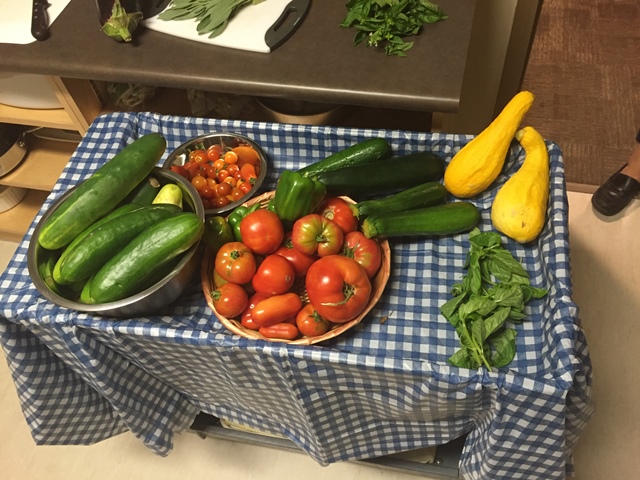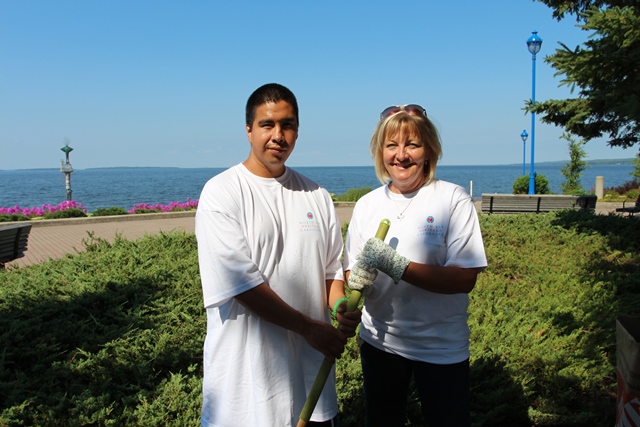Mary says she thought gardening would be ‘too difficult’. Mary, a mental health patient at the North Bay Regional Health Centre (NBRHC), was approached by another Mary, Mary Chamberlain who is a Recreational Therapist in NBRHC’s Mental Health & Law Division, about taking part in a new Horticultural program. “I thought I wouldn’t know how to do it – it would be too complicated,” Mary says. “But Mary [Chamberlain] taught me how easy it is.”
Gardening as therapy
Chamberlain says a need was identified at the hospital to address healthy eating, healthy food choices and exercise. “Horticulture therapy is one way to promote healthy eating and exercise within our hospital,” she says. Research shows gardening is good for mental health, well-being and the reduction of stress and depression. “We also know that when you participate in growing your own fruits and vegetables, you are more likely to eat four or more servings a day.”
Chamberlain leads a small group of patients who meet regularly to garden both at the Health Centre and in the community. “Our group started by planting seedlings in February or March,” Chamberlain says. “We talked together about what we wanted our gardens to look like, what work we needed to do. Then when the snow melted we saw what we had to do and got started.”
Together the patients planted vegetables in the six raised beds and flowers in the ground outside. Mary planted pumpkin, green pepper, and zucchini seeds. “She [Mary Chamberlain] had to teach me how to do this because I had never gardened before. I had to learn that we have to water the plants every other day – and sing to them,” Mary says with a laugh. “The only other plants I had before were artificial plants in my apartment.”
Chamberlain says the patients in the program got very involved in the process and were excited to watch their seedlings grow. “As soon as I would come onto the unit, patients are eagerly asking me about gardening, they are interested in seeing the progress of what they’ve done; what they’ve grown.”
This enthusiasm even translated into after hour ‘assignments’. “Because we’ve had such a hot, dry, summer, I had asked some of the patients if they would water at night on their own off unit privileges which are authorized by the clinical team,” Chamberlain says. “We knew that watering in the afternoon in the full sun was just burning the plants and the water was evaporating.”
Chamberlain says a patient volunteered and came out each night at 7:00 pm to water the garden.
This kind of team effort lead to gardens that were flourishing by mid-July.
Owl Lodge Garden
Owl Lodge, a general secure 16-bed co-ed unit in NBRHC’s Mental Health and the Law program, boasts another of the hospitals patient-led gardens. Brett Nesbitt, a Registered Practical Nurse, says patients put a lot of work to get the garden ready this year after years of not being used. “This year when we started the garden again there was nothing but weeds. We started very late in the growing season – the garden didn’t get planted until the third week of June,” Nesbitt says. “It was probably 30 hours of work to clean it all up and get planted.’ Nesbitt says the majority of the plants and items used on the unit came from staff donations, as well as donations from the horticulture centre here in the hospital. “Every day we are out here with one or two patients – weeding, watering, cleaning, picking vegetables, eating them.”
One of the patients who took part in the garden on Owl Lodge is Michel. Michel says gardening is his favourite activity, and takes particular pride in the tomatoes, corn and squash he has watched grow. “I just put the seeds in, and what we see here now is unbelievable,” Michel says, gesturing to the garden behind him. He says he enjoys gardening when he has a chance because he gets to spend time outdoors, and the vegetables they grow are healthy and affordable. “I think if I am discharged from here I would come back and continue with the garden even if I wasn’t paid. I would volunteer there.”
Partnership with North Bay Heritage Gardeners
As the weeks went by and the workload became less for the garden at the Health Centre, Chamberlain says they looked to use the skills to help give back to the community. “That’s where our partnership started with the North Bay Heritage Gardeners,” Chamberlain explains.
The North Bay Heritage Gardeners is the volunteer group responsible for the maintenance of the vast amount of beautiful gardens along North Bay’s waterfront. The group designated a portion as the ‘hospital’ garden, and every other week in the summer Chamberlain and a group of patients travel there to take care of the area. “The skills our patients have learned here, we are incorporating into the community while also giving back to the City of North Bay,” Chamberlain says.
Mark is one of the patients who actively participated in the garden at both the Health Centre and at the waterfront. He says he enjoys the time he has been able to spend gardening and would like to expand the offerings they have at the waterfront. “I’d love to be able to plant some flowers to bring some colour down here and beautify the space,” he says.
Harvest lunch

As the summer drew to a close, Mark was one of the patients who gathered to prepare themselves a lunch with the actual fruits [veggies] of their labour. The group made a pasta dish-made from zucchini ‘noodles’—with a tomato sauce and salad filled with greens, cucumbers, tomatoes and peppers.
“We want to show that is doesn’t have to be difficult or expensive to grow your own food,” Chamberlain says. “We’ve grown things in tuna cans, old margarine containers, anything we have available. It’s just so nice for the patients to have the experience of growing their own food and having a delicious and nutritious lunch—and to know they can do this for themselves even upon discharge. They don’t need farmland or acreage to grow healthy foods for themselves.”
Lindsay Smylie Smith is a Communications Specialist at North Bay Regional Health Centre.




